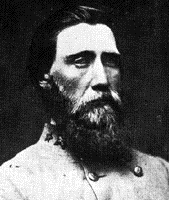
|
|
VITAL STATISTICS
|
BORN: 1831 in Owingsville, KY.
DIED: 1879 in New Orleans, LA.
CAMPAIGNS: Yorktown, Peninsula, Gaines' Mill, Malvern Hill, Second Bull Run, Antietam, Fredericksburg, Getysburg, Chickamauga, Atlanta, Franklin, Nashville.
HIGHEST RANK ACHIEVED: General.
|
|
BIOGRAPHY
|
| John Bell Hood was born in Owingsville, Kentucky, on June 1, 1831. He grew up hearing popular stories about the Mexican War and tales told by his grandfather about Indian fighting. With help from his uncle, Congressman Richard French, young Hood was able to obtain an appointment to the US Military Academy at West Point. Although he was a poor student with disciplinary problems, he managed to graduate in 1853. After graduation, he a was assigned to Fort Columbus, New York, then transferred to Fort Jones in northern California. In March of 1855, he was commissioned a 2d lieutenant in the 2d US Cavalry, which had officers including Col. Albert Sidney Johnston, Lt. Col. Robert E. Lee, Maj. William J. Hardee and Maj. George H. Thomas. Early in his military career, Hood began choosing aggressive military tactics over more passive ones. He also developed a boldness, often to the point of recklessness, which contributed to both his later successes and failures. In April of 1861, Hood resigned from the US Army and joined the Confederates as a 1st lieutenant of cavalry. Serving on recruitment duty in Kentucky for a few weeks, he was then transferred to Yorktown, Virginia. Hood quickly rose through the ranks, and was promoted to brigadier general on March 6, 1862. He took command of the Texas Brigade, which became known as Hood's Texas Brigade. With an aggressive leadership style, he led his troops in several engagements, and acquired an excellent reputation among Confederates for courage and effectiveness. Hood took part in the Peninsula Campaign, as well as the Battles of Gaines' Mill, Malvern Hill and Second Bull Run. Promoted to major general on October 10, 1862, he was given divisional command under Maj. Gen. James Longstreet. Hood led his division in the Antietam Campaign, and at Fredericksburg. Hood was wounded in the left arm at Gettysburg, but was later able to lead several divisions at Chickamauga. He was wounded again, and doctors had to amputate his right leg, after which Hood spent some time recuperating in Richmond. Hood was promoted to lieutenant general on February 1, 1864, to rank from the Battle of Chickamauga, he commanded a corps in the Atlanta Campaign. He was temporarily given command of the Army of Tennessee in July of 1864, but was reluctant to take over Gen. Joseph E. Johnston's position. When Confederate President Jefferson Davis insisted, Hood accepted, but was unsuccessful later that month at Peachtree Creek and the Battle of Atlanta. In September of 1864, at the Battle of Jonesborough, Hood retreated from Union Maj. Gen. William T. Sherman, trying to draw the Union troops away from Atlanta. This attempt was unsuccessful, as was a subsequent attempt to retake Tennessee and secure Kentucky north to the Ohio River. In the Franklin and Nashville Campaign, Hood and his troops lost many casualties at Franklin, He suffered a decisive defeat by Union forces at Nashville. In January of 1865, Hood was relieved, at his own request, and served in no further field command positions. He ended his military career when he surrendered at Natchez, Mississippi on May 31, 1865, while he was on orders to join the Trans-Mississippi Department. After the Civil War ended, Hood settled in New Orleans, and worked as a factor and commission merchant. Later, he entered the insurance business. He became moderately wealthy, but later lost much of his wealth when his business faired poorly. On August 30, 1879, a few days after the death of his wife and oldest child, Hood died of yellow fever. He was survived by 10 other children. Hood's friends arranged for his war memoirs to be published, and the proceeds were used to provide for Hood's orphaned children. The book, published in 1880, was entitled "Advance and Retreat," and it became a classic work of Civil War literature. |
|